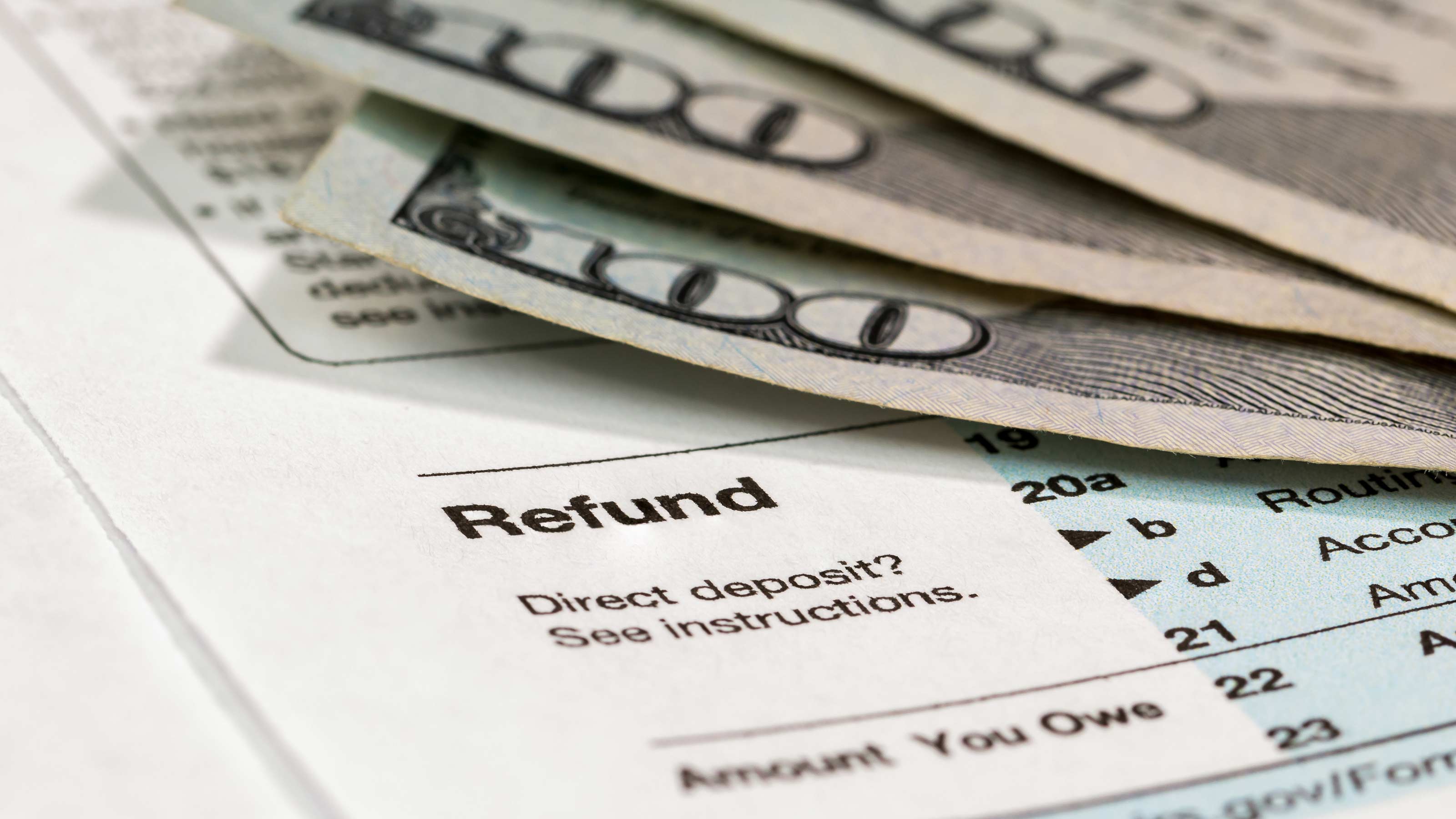The IRS Just Sent More Unemployment Tax Refund Checks
With the latest batch, Uncle Sam has now sent tax refunds to over 11 million Americans for the $10,200 unemployment compensation tax exemption.

Profit and prosper with the best of Kiplinger's advice on investing, taxes, retirement, personal finance and much more. Delivered daily. Enter your email in the box and click Sign Me Up.
You are now subscribed
Your newsletter sign-up was successful
Want to add more newsletters?
If you received unemployment benefits last year and filed your 2020 tax return relatively early, you may find a check in your mailbox soon (or a deposit in your bank account). Since May, the IRS has been sending tax refunds to Americans who filed their 2020 return and reported unemployment compensation before tax law changes were made by the American Rescue Plan.
The tax agency recently issued about 430,000 more refunds (totaling more than $510 million) averaging about $1,189 each. That brings the total count to over 11.7 million refunds totaling $14.4 billion for the 2020 unemployment compensation exclusion.
About the Unemployment Compensation Exemption
The American Rescue Plan Act, which was enacted in March, exempts up to $10,200 of unemployment benefits received in 2020 ($20,400 for married couples filing jointly) from federal income tax for households reporting an adjusted gross income (AGI) less than $150,000 on their 2020 tax return. If you received more than $10,200 in unemployment compensation last year, any amount over $10,200 is still taxable.
From just $107.88 $24.99 for Kiplinger Personal Finance
Become a smarter, better informed investor. Subscribe from just $107.88 $24.99, plus get up to 4 Special Issues

Sign up for Kiplinger’s Free Newsletters
Profit and prosper with the best of expert advice on investing, taxes, retirement, personal finance and more - straight to your e-mail.
Profit and prosper with the best of expert advice - straight to your e-mail.
The IRS has identified over 10 million people who filed their tax returns before the plan became law and is reviewing those returns to determine the correct amount of tax on their unemployment compensation. For those affected, this could result in a refund, a reduced tax bill, or no change at all. (You can use the IRS's Interactive Tax Assistant tool to see if payments you received for being unemployed are taxable.)
The IRS started recalculating impacted tax returns with returns from single taxpayers who had relatively simple returns, such as those filed by people who didn't claim children as dependents or any refundable tax credits. The tax agency then shifted to joint returns filed by married couples who are eligible for an exemption up to $20,400 and others with more complex returns.
Remember, though, that the tax exemption only applies to unemployment benefits received in 2020. So, if you receive unemployment compensation in 2021 or beyond, expect to pay federal tax on the amount you get.
Refunds for Unemployment Compensation
If you're entitled to a refund, the IRS will directly deposit it into your bank account if you provided the necessary bank account information on your 2020 tax return. If valid bank account information is not available, the IRS will mail a paper check to your address of record. (If your account is no longer valid or is closed, the bank will return your refund to the IRS and a check will be mailed to the address the tax agency has on file for you.) The IRS says it will continue to send refunds until all identified tax returns have been reviewed and adjusted.
The IRS will send you a notice explaining any corrections. Expect the notice within 30 days of when the correction is made. Keep any notices you receive for your records, and make sure you review your return after receiving an IRS notice.
The refunds are also subject to normal offset rules. So, the amount you get could be reduced (potentially to zero) if you owe federal tax, state income tax, state unemployment compensation debt, child support, spousal support, or certain federal non-tax debt (i.e., student loans). The IRS will send a separate notice to you if your refund is offset to pay any unpaid debts.
Should I File an Amended Return?
Although the IRS says there's no need to file an amended return, some early filers may still need to, especially if their recalculated AGI makes them eligible for additional federal credits and deductions not already included on their original tax return.
The IRS, for example, can adjust returns for those taxpayers who claimed the earned income tax credit and, because the exemption changed their income level, may now be eligible for an increase in the tax credit amount which may result in a larger refund. That said, most taxpayers will need to file an amended return if they didn't originally claim the tax credit, or other credits like the additional child tax credit, but now are eligible because the exclusion changed their income, according to the IRS. (These taxpayers may want to review their state tax returns as well.)
There are two exceptions to this general rule. First, you don't need to file an amended return to claim the recovery rebate credit, earned income tax credit with no qualifying children, or the premium tax credit even if it wasn't claimed on your return. If you're suddenly eligible for these credits when the unemployment exemption is applied, the IRS will calculate the credit for you and include it in any overpayment. Second, don't file an amended return to claim the additional child tax credit or earned income tax credit if you reply to a notice from the IRS stating you may be eligible for one of these credits and you're not requesting any other changes to your 2020 tax return.
E-Filing Your 2021 Tax Return
Next year, when you try to e-file your 2021 tax return, you will have to sign and validate your electronic return by entering your prior-year AGI or your prior-year Self-Select PIN. If you use your AGI, make sure to use the AGI as originally reported on Line 11 of your 2020 Form 1040 or 1040-SR. Don't use the corrected AGI if the IRS adjusts your 2020 return to account for the unemployment exclusion.
Withholding from Unemployment Compensation
Again, the $10,200 exemption only applies to unemployment compensation received in 2020. So, to avoid a big tax bill when you file your 2021 return next year, consider having taxes withheld from any remaining unemployment payments you receive this year.
Contact your state unemployment office to have federal income taxes withheld from your unemployment benefits. You may be able to use Form W-4V to voluntarily have federal income taxes withheld from your payments. However, check with your state to see if it has its own form. If so, use the state form instead.
Victims of Unemployment Fraud
Whenever the government starts sending checks, criminals will try to get their hands on some of that money. That's certainly the case with the unemployment compensation tax refunds. The good news is that you won't be punished if a crook uses your name and personal information to steal a tax refund from Uncle Sam.
So, for example, if you received an incorrect Form 1099-G for unemployment benefits that you didn't receive, the IRS won't adjust your tax return to add the unemployment compensation to your taxable income. You should still report the fraud to the state workforce agency that issued the incorrect form, though.
What About State Taxes?
Just because the federal government is waiving taxes on the first $10,200 of your 2020 unemployment benefits, that doesn't mean your state will too. To see if your state has adopted the federal exemption for state tax returns, see Taxes on Unemployment Benefits: A State-by-State Guide.
Profit and prosper with the best of Kiplinger's advice on investing, taxes, retirement, personal finance and much more. Delivered daily. Enter your email in the box and click Sign Me Up.
Rocky Mengle was a Senior Tax Editor for Kiplinger from October 2018 to January 2023 with more than 20 years of experience covering federal and state tax developments. Before coming to Kiplinger, Rocky worked for Wolters Kluwer Tax & Accounting, and Kleinrock Publishing, where he provided breaking news and guidance for CPAs, tax attorneys, and other tax professionals. He has also been quoted as an expert by USA Today, Forbes, U.S. News & World Report, Reuters, Accounting Today, and other media outlets. Rocky holds a law degree from the University of Connecticut and a B.A. in History from Salisbury University.
-
 How Medicare Advantage Costs Taxpayers — and Retirees
How Medicare Advantage Costs Taxpayers — and RetireesWith private insurers set to receive $1.2 trillion in excess payments by 2036, retirees may soon face a reckoning over costs and coverage.
-
 3 Smart Ways to Spend Your Retirement Tax Refund
3 Smart Ways to Spend Your Retirement Tax RefundRetirement Taxes With the new "senior bonus" hitting bank accounts this tax season, your retirement refund may be higher than usual. Here's how to reinvest those funds for a financially efficient 2026.
-
 5 Retirement Tax Traps to Watch in 2026
5 Retirement Tax Traps to Watch in 2026Retirement Even in retirement, some income sources can unexpectedly raise your federal and state tax bills. Here's how to avoid costly surprises.
-
 3 Smart Ways to Spend Your Retirement Tax Refund
3 Smart Ways to Spend Your Retirement Tax RefundRetirement Taxes With the new "senior bonus" hitting bank accounts this tax season, your retirement refund may be higher than usual. Here's how to reinvest those funds for a financially efficient 2026.
-
 5 Retirement Tax Traps to Watch in 2026
5 Retirement Tax Traps to Watch in 2026Retirement Even in retirement, some income sources can unexpectedly raise your federal and state tax bills. Here's how to avoid costly surprises.
-
 Paper Tax Filers Face Long Wait as IRS Digitization Effort Stalls
Paper Tax Filers Face Long Wait as IRS Digitization Effort StallsTax Filing Last April, the IRS launched its Zero Paper Initiative to speed up paper tax return processing. The project isn’t going well.
-
 First the Penny, Now the Nickel? The New Math Behind Your Sales Tax and Total
First the Penny, Now the Nickel? The New Math Behind Your Sales Tax and TotalRounding Tax A new era of "Swedish rounding" hits U.S. registers soon. Learn why the nickel might be on the chopping block, and how to save money by choosing the right way to pay.
-
 Over 65? Here's What the New $6K Senior Tax Deduction Means for Medicare IRMAA
Over 65? Here's What the New $6K Senior Tax Deduction Means for Medicare IRMAATax Breaks A new tax deduction for people over age 65 has some thinking about Medicare premiums and MAGI strategy.
-
 How to Open Your Kid's $1,000 Trump Account
How to Open Your Kid's $1,000 Trump AccountTax Breaks Filing income taxes in 2026? You won't want to miss Form 4547 to claim a $1,000 Trump Account for your child.
-
 In Arkansas and Illinois, Groceries Just Got Cheaper, But Not By Much
In Arkansas and Illinois, Groceries Just Got Cheaper, But Not By MuchFood Prices Arkansas and Illinois are the most recent states to repeal sales tax on groceries. Will it really help shoppers with their food bills?
-
 7 Bad Tax Habits to Kick Right Now
7 Bad Tax Habits to Kick Right NowTax Tips Ditch these seven common habits to sidestep IRS red flags for a smoother, faster 2026 income tax filing.


